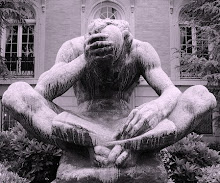 A half-baked musing on that old chestnut, the linguistic sign.
A half-baked musing on that old chestnut, the linguistic sign.In preparation for my Orals Exam, I'm going back and reading a small portion of de Saussure's Course in General Linguistics (for the part about meaning being created by difference/negation). Funnily enough, there are still notes in my theory reader from four years ago when I was reading it on lunch breaks while (not)working at Brown McCarroll (NB: I do not recommend reading Jaobson's "Two Aspects of Language" and then returning to the world of asbestos litigation...talk about aphasia...). Looking back on those notes (and diagrams), I didn't get Saussure's ideas. At all.
Sure, I understood that the signifier and signified have an arbitrary relationship, but I guess I had read too much Lacan by that point to see that the whole play of signifiers idea flows naturally out of Saussure's ideas.
"On the one hand the concept [aka, the signified] seems to be the counterpart of the sound-image [aka, the signifier], and on the other hand the sign itself is in turn the counterpart of the other signs of language."Saussure here seems to be doing the legwork for what Lacan thinks he discovered--disconnecting the function of the linguistic sign from the ontology of it.* It seems to me that a Saussurian linguistic sign is like the Wizard of Oz. There is the concept/signified (the actual Kansan huckster, Professor Marvel) and then there is the sound-image/signifier (the All-Powerful Oz). One is a disappointment once the curtain has been pulled away; the other is a lot of hype, hot air, and tricks. The one hides and is (mis)represented by the sound-image/signifier, which interacts with others and (re)creates the concept/signified as it does so. Remember, there'd be nothing sad or disappointing about Professor Marvel if it hadn't been for the representation of The Wizard of Oz, but it's also true that The Wizard began to function independently of its concept/signifier the longer it interacted with those in the land of Oz.
*Yeah, I know Lacan references Saussure often enough, but I haven't seen anything that gives him the sort of finder's-fee credit he probably deserves. It could be out there, but I just haven't seen it.

No comments:
Post a Comment